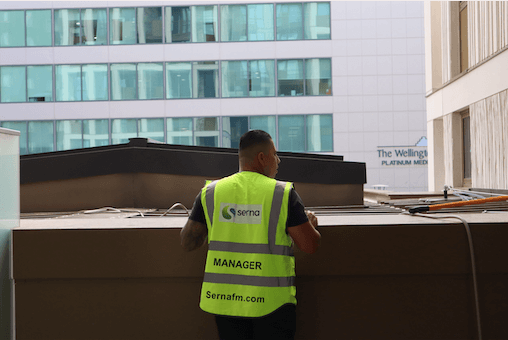Facilities management encompasses a wide range of services designed to ensure buildings are functional, safe and efficient. Within this realm, hard services specifically refer to the physical and structural components of a building that require regular maintenance, repair or upgrading. These are essential services that directly impact the safety and operational efficiency of any facility.

What Are Facilities Management Hard Services?
Hard services are integral to the core functionality of a facility. They include aspects such as heating, ventilation, air conditioning, electrical systems, plumbing and structural maintenance.
These systems not only ensure the smooth operation of a building but also comply with regulatory and safety standards. For example, regular inspections of electrical systems prevent hazards and maintain compliance with health and safety laws.
What Are Examples of Hard Services in Facilities Management?
Hard services cover a vast range of building components. Common examples include the maintenance of elevators, fire safety systems and lighting. Additionally, services like boiler servicing, building insulation and emergency generators fall under this category.
Essentially, these are non-negotiable services, as they ensure the health and safety of employees, visitors and occupants alike. Without well-maintained hard services, businesses risk costly breakdowns and potential non-compliance penalties.
What Is The Importance of Regular Maintenance With Hard Services?
Maintaining hard services is not just about avoiding disruptions; it’s also a critical aspect of cost control. Studies indicate that regular maintenance can reduce overall building repair costs by up to 30%, as it helps identify and address issues before they escalate. For businesses, this means fewer disruptions to daily operations and less financial strain in the long term.
Is Safety and Compliance Factored Into Hard Services in Facilities Management?
Safety is one of the primary reasons hard services are so vital in facilities management. For example, poorly maintained fire alarms or extinguishers can fail in emergencies, putting lives at risk.
Similarly, faulty electrical wiring increases the likelihood of fires and accidents. The Health and Safety Executive (HSE) in the UK mandates regular maintenance of these systems to meet workplace safety regulations, underscoring the importance of hard services in creating a secure environment.
Does Hard Services in Facilities Management Play A Role in Energy Efficiency?
Hard services also play a significant role in energy efficiency. Air conditioning systems, for instance, can consume a significant amount of energy if not properly maintained.
According to the Carbon Trust, businesses can reduce their energy bills by up to 20% by implementing more efficient building services and conducting regular maintenance. This not only saves money but also supports sustainability initiatives, which are increasingly important to both businesses and consumers.
What Is The Role of Technology in Hard Services?
Modern technology has transformed how hard services are managed. Smart building systems, for example, allow for real-time monitoring of air conditioning systems, electrical usage and structural integrity.
Predictive maintenance, powered by artificial intelligence, can identify potential issues before they occur, minimising downtime and repair costs. By integrating technology into hard services, facilities managers can provide a more efficient and proactive approach to building management.
What Is The Difference Between Hard Services And Soft Services In Facilities Management?
Understanding the difference between hard and soft services is crucial in facilities management. While hard services focus on the physical aspects of a building, soft services pertain to non-physical elements, such as cleaning, security and waste management. Hard services are mandatory for a building’s safety and functionality, whereas soft services, although important, are more about improving the overall experience for occupants.

Can You Outsource Hard Services?
Many businesses choose to outsource hard services to specialised facilities management providers. These providers bring expertise, advanced technology and dedicated teams to handle maintenance, repairs and upgrades.
Outsourcing also ensures compliance with legal standards, as professional facilities management companies stay up to date with the latest regulations. For businesses, this approach often leads to better efficiency and cost savings.
What Do Hard Services Entail in Different Industries?
The requirements for hard services vary across industries. In healthcare, for instance, facilities must maintain stringent standards for HVAC systems to prevent contamination and ensure patient safety. In the manufacturing sector, equipment maintenance is critical to avoid production delays.
Retail spaces, on the other hand, rely heavily on lighting and climate control to enhance the customer experience. Despite the differences, all sectors depend on reliable hard services to maintain operational integrity.
What Are Future Trends in Hard Services?
As sustainability becomes a global priority, the future of hard services will likely focus on greener solutions. Renewable energy systems, such as solar panels, are being integrated into facilities to reduce carbon footprints.
Additionally, innovations like smart meters and energy-efficient HVAC systems are gaining traction. These advancements not only contribute to sustainability but also reduce operating costs for businesses.
The Bottom Line
Hard services are the backbone of facilities management, ensuring the structural integrity and operational efficiency of buildings. From HVAC systems to electrical maintenance, these services are indispensable for safety, compliance and energy efficiency.
As technology advances and sustainability becomes more prominent, the management of hard services will continue to evolve, offering businesses new opportunities to optimise their operations. By prioritising regular maintenance, companies can create safer, more efficient environments for their employees and customers.

